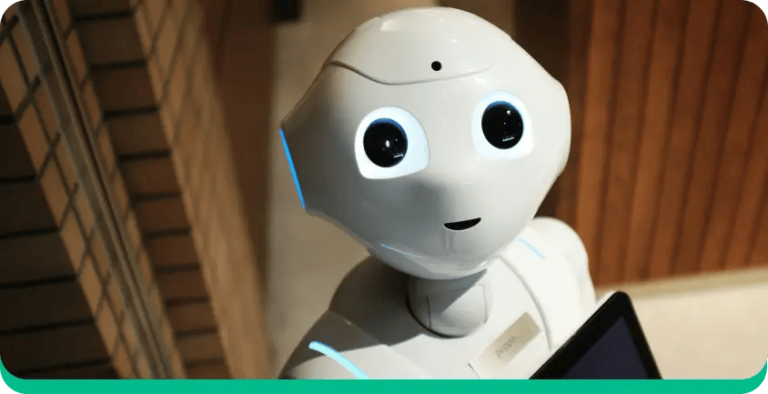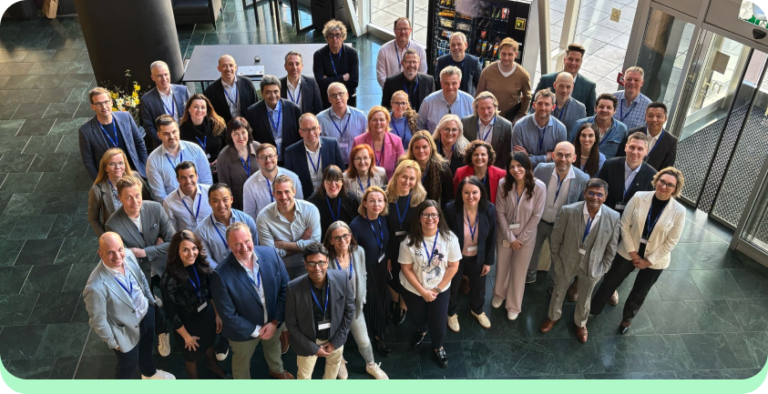From emotional intelligence to relationship building, these uniquely human abilities will continue to set leaders and organizations apart and these are just some of the skills that AI can complement, but never replace.

“Genuine relationships are the basis for creating trust, the ultimate driving fuel of any successful organisation and the cornerstone on which our whole society and economy are built.“
Even though the first main hype of AI is slowly fading away, we cannot deny that it absolutely and profoundly changes how we work and will continue to revolutionise industries, through its ability to automate tasks, analyse data, and even mimic creative processes. According to McKinsey, generative AI could add 4.4 trillion to the global economy, annually. Unfathomable numbers. Also McKinsey found in 2023, that by 2030 activities that account for up to 30 percent of hours currently worked across the US economy could be automated—a trend accelerated by generative AI. Therefore the long-lasting and profound impact of AI is unequivocal. Nonetheless, despite AI’s remarkable advancements, certain human skills remain irreplaceable. In a world increasingly shaped by technology, these uniquely human abilities will continue to set people and organisations apart in the evolving talent landscape, and by mastering and nurturing these skills and capabilities within your company, you can future-proof yourself and remain an employer of choice.
Up until very recently the most accepted way to measure intelligence was through a series of IQ (intelligence quotient) tests. That is an area where AI will certainly surpass humans very soon (if not already). Lately, though, EQ (emotional quotient) has gained just as important role, if not more important – especially in certain roles – than IQ, and through the very nature of things, that is where AI will never be able to compete with humans. Being emotionally intelligent doesn’t only mean that you are cordial, and attentive in your business communication and correspondence which AI can certainly do, it will never be able to sense and respond to emotions in a humane way, build relationships and confidentiality through the ups and downs of an interpersonal connection. Imagine you trust a program with the deepest of your secrets – you are one hack away from having it all public. Not to mention when it comes to managing teams, mediating, handling conflicts or showing true empathy. Leaders and managers who can read a room, understand the emotional needs of their colleagues, and respond compassionately will always have an advantage over an AI program or solution, no matter the shape or form of it, especially in the world of talent acquisition, where the fate of people’s careers is decided every day. Empathy is a skill that is not only a ‘nice-to’ but a ‘must have’.
Creativity is a unique human trait that AI can never replace. While AI can generate art, design solutions, and suggest innovative approaches, it is inherently limited to its initial programming. Human creativity, on the other hand, knows no boundaries. It stems from abstract thinking, curiosity, and the ability to make connections between seemingly unrelated ideas. This ability to imagine and innovate in ways that defy convention drives significant breakthroughs in art, science, business, and the world of talent. It’s what fuels disruptive ideas and allows humans to push beyond the limits of pre-existing frameworks. When creativity is underpinned and supported by different AI solutions, it can create impact and recreate the best of your ideas more easily. So the two can and should work very well together, with human creativity always leading the way.
Similarly, critical thinking and judgment are areas where AI could improve with a well-seasoned professional. AI can process vast amounts of information and offer logical recommendations in ambiguous situations or ethical dilemmas. Humans possess the unique ability to navigate complexity, weigh moral implications, and make decisions based on intuition, experience, and contextual understanding – and only sometimes follow the most logical or, in this particular way, seemingly most reasonable outcome. Especially when making decisions about people, their career paths, and their development. Many things that are not always quantifiable will need to be considered. Therefore, it is impossible to put this into a model that AI could use to decide. This is where human judgment shines, and it’s a crucial part of the decision-making process that AI can’t replicate.

Critical thinking also plays an essential role in overcoming non-zero-sum situations. While AI can optimise outcomes based on pre-set objectives, humans excel in situations where multiple parties have different goals, and the outcome doesn’t have to be a winner-takes-all scenario. This is especially true in recruitment. Hiring managers usually enter the hiring process with a very exact and set list of requirements – many of which later are found to be unnecessary or create hurdles in finding the actual perfect candidate. Even if “on paper” that candidate might not fit all the pre-set requirements. A great talent partner will be able to understand the broader context, balance competing interests, and find innovative ways to turn demands and needs into compromise and solutions —skills that demand human ingenuity. AI might be able to predict potential outcomes based on a CV, filled-out forms, or even a transcribed interview, but it lacks the human instinct for compromise and the ability to recognise opportunities where everyone involved can gain and get closer to their ultimate goals.
And last but most importantly, AI will never be able to create true, real, and fulfilling relationships, and understand and react properly to emotions. According to Forbes, people actually have limited trust that AI can understand human behaviour at work better than real leaders (57% don’t trust and 22% are neutral). Even more, 60% of respondents are concerned about the possibility of AI analysing and leveraging employee emotions for decisions. So AI might be able to mimic that, but the real whimsical nature that makes a relationship a true one is something that a machine will never be able to do. Genuine relationships are the basis for creating trust, which is the ultimate driving fuel of any successful organisation and the cornerstone on which our whole society and economy is based on.
With all of the above said, we, at Meijer &Co, strongly believe that AI has an important role in making our industry better and even more efficient. We do use Gen AI tools every day. It helps us go through countless resumes, identifying candidates who meet specific criteria and saving us valuable time. Additionally, AI-powered tools enable us to discover passive candidates on various platforms, expanding our reach beyond traditional job boards. During interviews, AI transcribes and summarises conversations, allowing recruiters to focus on the candidate’s responses and assess their fit for the role. Even in sales meetings, AI proves beneficial by taking notes, freeing up our team’s focus and energy to build stronger relationships with our current and future clients. This combination of AI and human expertise empowers us to make more informed hiring decisions and attract top talent. By leveraging AI’s capabilities while maintaining the essential human touch, we’re able to streamline our processes and deliver exceptional results.
Yes, AI might be able to do most of the jobs that we see today on the market, and will certainly create countless new ones – but the ultimate decision-maker shall remain a human. That is why every organisation needs to go the extra mile to invest even further in their human workforce, to future-proof themselves and create companies that are resilient for many decades to come. To summarise it in one sentence: use AI to replace tasks and positions – but never the actual people.


